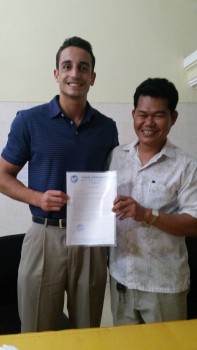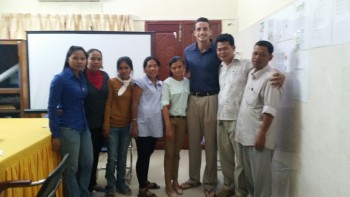 The Cambodia Chronicles
The Cambodia Chronicles
by Alex Sobrado
I graduated from Northeastern in January (2015) and am glad to say that I have a job lined up in San Diego starting in July. Having a few months off, I wanted to travel and try my hand at working in microfinance. After working an average of 90 hours a week in my last investment banking internship, the thought of using finance for something meaningful really intrigued me.
How did you prepare for that experience and what did you learn?
Coming in I had read several books on microfinance but was never really exposed to the nuts and bolts of the implementation process. Cambodian Volunteers for Community Development (CVCD’s) microfinance program was very new and had no form of impact measurement. They didn’t even have one clear manager of the program, so there was a lot to be done. Given the constraints, I had to learn how to run an entire microfinance program, as well as how business in a developing country can differ from that in a developed one.
Can you tell us a bit more about the work you had to do?
My work centered around implementing new measurement systems to track impact and general financial performance. Like in many NGOs, funding was a large concern. Consequently, I came into the organization trying to find ways to expand the microfinance program so that it would be profitable enough to fund the non-profit activities of CVCD. I connected the organization with several donors and implemented new methods of impact tracking. By the end of my trip I had created a plan that would allow the organization to (hopefully) receive several millions of dollars of outside funding over the course of three years. I’ve also been asked to stay on as a permanent advisor to the microfinance program (working remotely). I have accepted their offer and am proud to continue being a member of the team!
What was the most challenging part of your stay in Cambodia?
As I mentioned, I had no idea how different doing business in a developing country would be. The language barrier and a lack of true understanding of the culture proved to be tough obstacles. For example, it was very difficult for me to receive clear messages from my coworkers, because of the variations in the style of communication compared to those used in the U.S.A. Also, I had to learn to deal with the challenges that corruption presents and realize that many were not given an opportunity to attain a level of education comparable to that of many in the US.
What advice do you think you could give to future graduates given the experiences you have now had?
I am pretty fresh out of undergrad so I’m not sure how wise I am yet! But I would say to future grads that it is important to find something you really enjoy doing and to not involve money in the initial decision. I had an opportunity to make over six figures starting out and I turned it down because of the lifestyle it would entail.
Finally, could you tell us a bit about your relationship with SEI?
I went on the South Africa trip knowing very little about SEI. I knew I wanted to visit parts of Africa and I viewed the trip as an opportunity to do so, as well as to learn about the culture and the living circumstances. I learned so much and had such a great time on the trip, that I decided to complete the Global Social Entrepreneurship minor upon returning to NU. Prof. Shaughnessy is really just an incredible instructor and I knew that I needed to continue learning from him.



